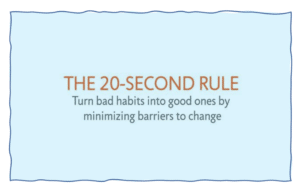By: Rima Muth
May 2020
So we are now over 45 days into sheltering in place. Some of us are rockin’ it – got your kids in a good routine, doing meal prep like a boss, and even managing to get 7-8 hours of sleep each night. Good for you!
Others of us might still be trying to figure things out as we juggle our work, child care/schooling, Zoom meetings with friends, and deal with grocery shopping. We see pictures of people doing really cool things on Pinterest – like learning to bake bread (sourdough or banana), whipping up coffee drinks – and, even though we shouldn’t compare ourselves, think “Wouldn’t in be nice to learn something new?”
Want to Improve Your Routines to Make More Time for Yourself?
Or maybe we just would like to improve on some of our new routines since all our old ones have been tossed into the wind. How do we develop better habits – like finding the time to do meal prep or get the kids to bed at a more reasonable hour or help them self-entertain better so we can just finish writing at least two emails without being interrupted?
Developing Good Habits Creates More Time
Developing habits is a hot topic thanks to books like Atomic Habits but James Clear, Tiny Habits by B.J. Fogg, and The Power of Habit by Charles Duhigg. There are also tons of smaller articles on the internet on this topic and these are a few things that I have learned: change is hard but very possible when you do not rely on motivation alone to make it happen.
Motivation + Planning = Success
Motivation is a fickle friend – we have tons of it on Monday morning but by the afternoon or evening it seems to have run off to play with someone else. And that is because if we do not have a solid plan to go with our motivation and are relying instead on will power, we have most likely exhausted (literally) our ability to execute our new habit, i.e. “I know I told myself I would [insert your new habit here] but I’m so tired I think I will watch Netflix instead.” Our brains and bodies simply take the path of least resistance because it is easier. So here is what you need to do to help get you take action:
7 Tips to Build New Habits & Be More Productive
1. Focus on building only one new very small habit
Although there may be many things we want to change all at once, the reality is that making big changes is hard. It is best to start with a small habit and gradually turn it into something bigger. You need to start with a new change that is so small, it is hard to say “no” to.
For example, instead of setting a goal of exercising for 30 minutes every day, you might want to start with walking every day for 10 minutes. Or even just 5 minutes! It is hard to tell yourself that you don’t have 5 minutes to walk – you could even do that in your house! Want to get up earlier or need your kids to get up earlier so that you can start your work day a bit earlier? Don’t set the clock for an hour earlier and be disappointed in yourself for rolling over and hitting snooze. Aim for a 10 minute change and you’ll find it easier to keep your commitment going.
2. Commit to a minimum of 30 days.
You need to allow time for a new habit to take root. We have all heard that it takes 21-66 days to form a new habit, right? Well, that is only somewhat true. It really depends on the individual and their circumstances but making a 30-day commitment is a pretty good timeframe to start out with in the beginning.
3. Anchor it to an existing habit
This comes directly from B.J. Fogg’s Tiny Habits. We do this instinctively for things like a new prescription we have to take – put the bottle next to our toothbrush or morning coffee cup, for example. But with many of us facing disrupted routines, it might feel a bit more challenging. But you probably have more in place than you realize.
You still have breakfast, lunch, and dinner to anchor your day. You can prep meals for the next day while you are prepping dinner or cleaning up after dinner You are already in the kitchen surrounded by food and then in the morning you do not have to carve out extra time to pack up meals. If you have prepped you and your kids’ lunch the night before or chopped up some extra veggies for dinner, you won’t have to stress about it while you are in the middle of a Zoom meeting or if your day has run longer that expected.
4. Identify and make a plan for obstacles
No one is going to be perfect all the time, even with the best of plans. There are six common obstacles people run into: time, pain, weather, space, costs, and self-consciousness. Sometimes, the difference between taking action or not comes down to a small step that eliminates a 20-second hurdle.
If you want your kid to keep practicing their violin, for example, can you keep the violin and music set up so that they don’t have to do this each time? Or, if you are spending more time binge watching TV at the end of the day, take the batteries out of your remote. You don’t have to hide them from yourself, but doing this will make you remember that you had planned to pick up a book instead. Or, less radical, leave the book you want to read on the sofa in your favorite spot so that you don’t have to look for it. You get the idea.
5. “Never miss twice.” -James Clear.com
It is normal to slip up now and then, especially now when all of our regular routines have been disrupted. But it is important to get right back on track. If you find yourself struggling on a regular basis, you might need to break your new habit into smaller pieces or see if you can identify an obstacle. If your child can’t read for 30 minutes a day, maybe you need to break it into two sittings of 15 minutes each. Or maybe the real problem is that he or she needs you nearby so maybe it can become part of your lunch time routine together.
6. Reward important milestones
Starting a new habit should be fun and milestones should be celebrated! If it isn’t any fun at all or doesn’t make your life feel easier or better somehow, why would you do it? If you have made a 30-day commitment to do something new, plan a reward either at the end or at the halfway point. Maybe it is a special family activity or a small purchase or a takeout from a slightly pricier restaurant.
7. Practice Patience with Yourself
Lastly, set a pace you can sustain. This might mean that it takes you longer to reach your ultimate goal of getting up at 5:30 AM or exercising 30 minutes every day. But if after 30 days you are consistently waking up 30 minutes earlier than you did before or maybe sometimes getting a 30-minute walk in and consistently getting at least 15 minutes, celebrate your newly forming habit where it is at and plan for the next 30 days.
You Can Develop New Habits and Be More Productive
Follow these seven tips for 30 days and you will be surprised how much more you’re getting done every day. Or even if you’re not getting them all done, you’ll certainly have less stress and feel more accomplished at the end of the day. Try it. What do you have to lose? Have fun and good luck!
About the author: Rima Muth is a Field Consultant, Metro LI Branch of Kumon NA. – www.kumon.com









